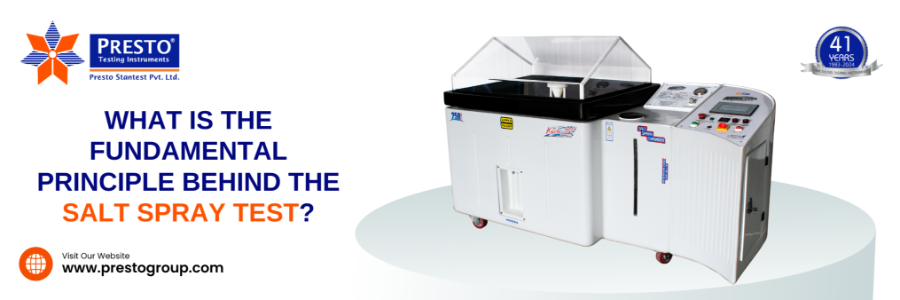What is the Fundamental Principle Behind the Salt Spray Test?

Are you curious about the secret behind ensuring durability and longevity in various products? If yes, then the Presto salt spray testing chamber is the secret behind this. This is one of the high-quality lab testing equipment that helps manufacturers assess the rust-proof ability of materials when exposed to salt-laden environments. This is one of the high-quality laboratory testing equipment that comes with the lowest count of 0.1°C. In this article, we dive deep into the fundamental principle that powers one of the most widely used tests in the manufacturing industry – the Salt Spray Test.
Perform Accurate Salt Spray Tests on the Materials with Presto Salt Spray Tester
Salt spray testing stands as a widely employed method, enabling manufacturers across diverse industries to assess the resistance of coatings against corrosion.
This testing method involves subjecting samples to a controlled environment of saltwater mist or fog. By doing so, it simulates the challenging conditions materials or coatings may encounter. The outcomes of the salt spray test furnish essential insights into a material's expected lifespan and its ability to perform in real-world applications.
By conducting the salt spray test with the help of Presto Cass cum salt spray chamber, manufacturers can easily get faster salt spray test results.
The Presto Cass Cum Salt Spray Testing Chamber stands as an advanced laboratory testing instrument meticulously crafted to assess the corrosion resistance of materials and coatings, adhering to global standards like ASTM B117. Engineered with a triple-walled structure featuring glass wool insulation, it offers precision and reliability in corrosion testing.
Fundamental Principle for Salt Spray Testing
The core principle of this test is when salt mist is applied on the materials then metal surfaces will go for oxidation or corrosion. The intensity of this process depends on factors such as environmental conditions, the particular type of metal, and the existence of protective coatings or finishes. The Presto salt spray corrosion tester ensures precise evaluation of materials' corrosion resistance, facilitating quicker laboratory testing results.
In a typical salt spray test, samples are placed inside a chamber and continuously exposed to a fine mist containing NaCl salt at regulated intervals for designated periods. You can read more on how you can easily conduct a salt spray test with the help of a CASS cum salt spray chamber.
Now, let's explore the significance of the salt spray test:
Significance of the Salt Spray Test in Quality Control
1. Assessing Corrosion Resistance:
- The primary goal is to evaluate a material's capacity to endure corrosive environments by subjecting it to a highly corrosive solution comprising water and salts, typically sodium chloride. This simulates harsh conditions the material may face during its intended use.
- Manufacturers can predict material performance in real-life scenarios, allowing them to make necessary modifications to enhance corrosion resistance before reaching consumers.
2. Examining Coatings and Finishes:
- The assessment effectively gauges the efficiency of coatings and finishes in hindering corrosion. Samples with coatings exposed to a corrosive setting aid in recognizing flaws or weaknesses in how the coating is applied or formulated.
3. Preventing Costly Product Damages:
- Corrosion may result in expensive repairs, replacements, and safety risks across diverse industries. Incorporating salt spray tests into the manufacturing process helps pinpoint potential corrosion concerns in advance.
- This proactive approach aids in making necessary improvements to product design or selecting more suitable materials that can withstand harsh environments, preventing expensive recalls and repairs.
4. Ensuring Quality:
- The salt spray test is pivotal for ensuring quality, providing a fair and standardized approach to evaluate materials' ability to resist corrosion.
- Aligning with standards specific to the industry reassures customers regarding the quality and performance of the product, fostering trust and elevating the brand's reputation.
5. Meeting Regulatory Standards:
- In sectors like automotive, aerospace, and marine, items must comply with specific regulatory standards before entering the market or use. These standards often encompass guidelines concerning material durability and resistance to corrosion.
- Salt spray testing guarantees products meet these criteria, permitting them to be introduced to the market or utilized without legal consequences.
From above mentioned points you will get an idea about the significance of salt spray tests in the quality control process. When the salt spray test is completed then users can easily and accurately interpret the test results and provide valuable insights into the product's durability.
It is also important to consider any applicable standards or specifications when interpreting results from a salt spray test. Different industries may have different requirements for corrosion resistance, and these standards should be taken into account when evaluating test results.
If you need a free sample testing session for this quality testing equipment, then you can give us a call at +919210903903 or email us at info@prestogroup.com. You can even consult us if you want to buy a cass cum salt spray chamber. By conducting this quality test on the materials, manufacturers can easily assess the characteristics of their materials against corrosion.
Author : -Gaurav Malhotra
Recent News
- Paper & Packaging Testing Instruments
- Paint, Plating & Coating Testing Instruments
- Plastic & Polymer Testing Instruments
- Environmental Testing Chambers
- PET & Preform Testing Instruments
- Color Measuring Testing Instruments
- View Entire Range Instruments

Catalogue 2023
Get information about new product launches, research, innovation and endeavors at Presto.
download Free CopyNeed more information
Connect with us for your business enquiries. Generally we respond within one or two working days.
send enquiriesContact Us
Quick quote
